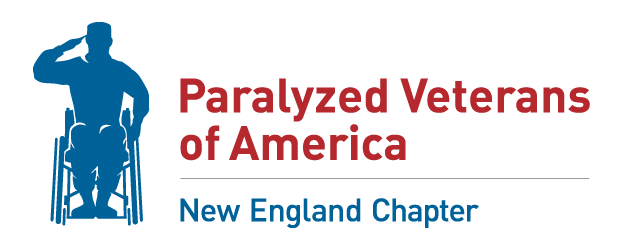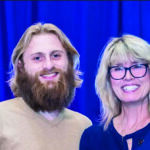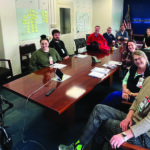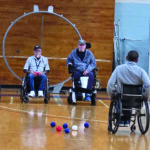Home // Sports & Activities // Athlete Spotlights // James Howard – U.S. Army Veteran
For Army veteran James Howard, adaptive sports helped fill a void he once thought only his military service could fill.
“I thought the military was going to be the only thing for me for a long time,” says Howard, who served in the Army from 2002 to 2010 with the 82nd Airborne and Special Forces training at Ft. Bragg. He deployed to Iraq where he escaped numerous near-death combat situations with minor injuries. But in 2008, Howard was injured in a service-connected accident that left him a quadriplegic.
“When I was first injured, I was unsure of how I could move on from my military career and still have a full quality of life,” he says.
When I was first injured, I was unsure of how I could move on from my military career and still have a full quality of life
With limited use of his arms and no use in his legs, Howard thought his future was set within the confines of his home. That was until he received his first handcycle, and after adapting the specially-designed cycle by duct-taping his hands to the handlebars and pushing with his shoulders, he immediately set out to complete an 11-mile ride. He was instantly hooked.
“When I was given my first handcycle, I realized there were things out there I could still do, that could fill the void of my military service,” Howard says. “Sports enabled me to see that there were others with worse injuries who I could learn from and in turn help others.”
Sports enabled me to see that there were others with worse injuries who I could learn from and in turn help others.
That initial discovery found in a handcycle has since paid dividends for the many lives Howard has touched through his advocacy work. He served on the board of the Independence Fund and currently works as a case manager for the Quality of Life Foundation and as the military veteran’s program coordinator for the Christopher and Dana Reeve Foundation.
Howard also worked alongside his mom and caregiver, Nancy Wellons, in her startup of a Lynchburg chapter of AMBUCS, a national nonprofit that customizes tricycles and bicycles for people with disabilities, particularly children. In 2014, Howard launched a Richmond nonprofit called REACHCycles, or Richmond Empowering Abilities for Children with Cycles, which has provided 70 bikes for disabled children in the past year. “Helping a disabled child always puts life in perspective, when you think you have it bad off,” he says.
In 2013, Howard represented another nonprofit, Veterans & Athletes United, an all-volunteer veterans organization that provides recreational activities to disabled veterans, including skydiving, horseback riding, weapons shooting, hunting, and fishing.
“I keep the mindset to keep active and physically fit and to help others do the same,” Howard says. “Maybe one day medical advances will get me out of this chair, but in the meantime, I’m going to stay active, enjoy life, and help others.”
Maybe one day medical advances will get me out of this chair, but in the meantime, I’m going to stay active, enjoy life, and help others.
Those three goals have spilled over into other aspects of Howard’s life, including his education and career. Following up on his 2002 undergraduate degree in civil engineering from the Virginia Military Institute, he is currently taking courses in universal design and home modification, all with the hope of one day starting his own business.
“I’d like to help those veterans who are not service-connected and don’t have access to all of the great benefits, as well as the elderly community and low-income families with disabled children,” Howard says. “I’m building the knowledge base now to have that business one day, but in the meantime, I’m happy to serve as an advocate for various groups.”
Amid his busy schedule, Howard has not given up on the physical activity and healthy lifestyle he has worked tirelessly to promote. In June 2015, he attended his third National Veterans Wheelchair Games in Dallas, co-presented by the US Department of Veterans Affairs and Paralyzed Veterans of America, where he earned medals in swimming, boccia and air rifles. “Paralyzed Veterans of America always helps me get to the events and stay active,” he says.
While Howard’s life alone speaks volumes of what can be done in spite of a catastrophic injury, he has not given up on speaking that truth into the lives of his fellow veterans and others with disabilities.
“I always tell others that they’re going to have to learn patience being in a wheelchair,” he says. “They also need to be open to others and reach out, which takes time. You may have bad days, but you’re going to learn from others who often are worse off but yet make the best of it.”




